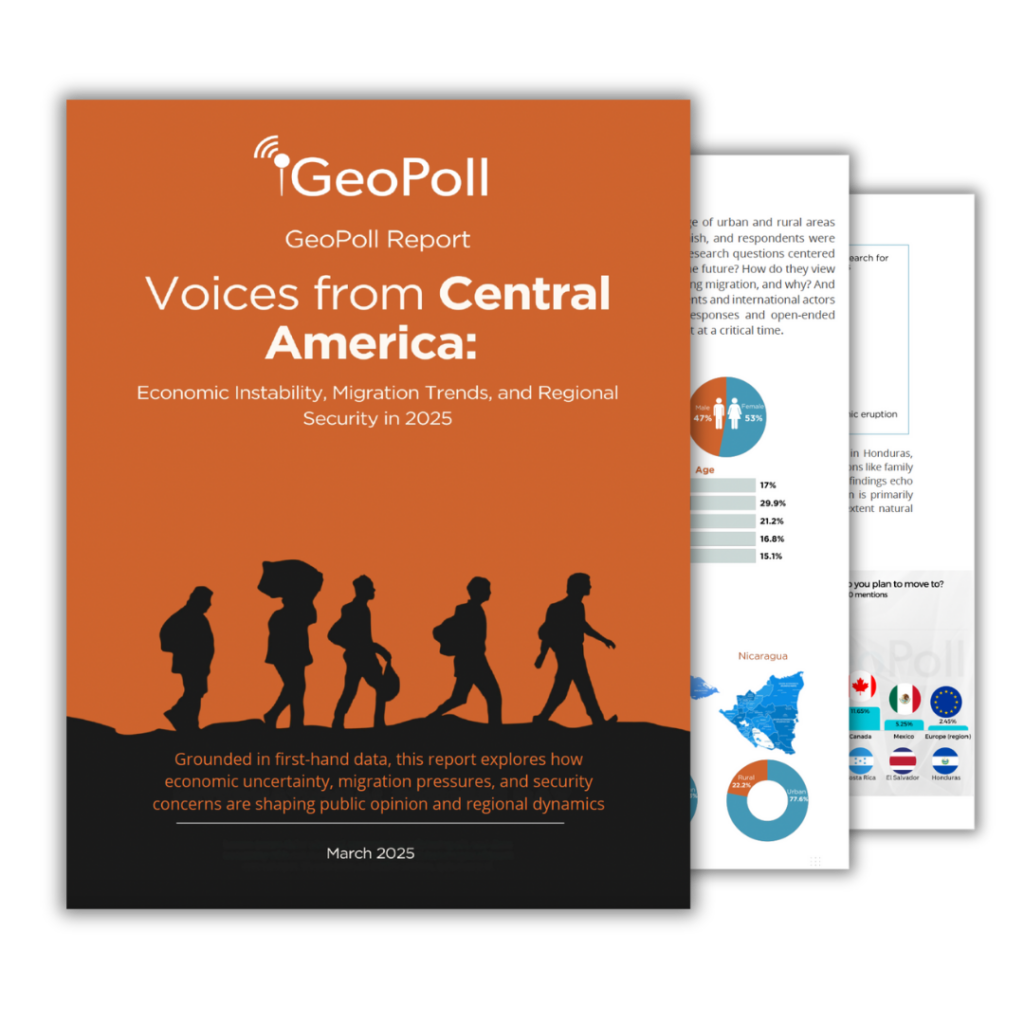GEOPOLL REPORT: VOICES FROM CENTRAL AMERICA
Breaking Insights: The Harsh Realities and Future of Central America in 2025
A Region on the Brink: Survival, Migration, and Hope

GEOPOLL REPORT: VOICES FROM CENTRAL AMERICA
A Region on the Brink: Survival, Migration, and Hope

Central America continues to confront a complex mix of socio-economic and political headwinds in 2025. Most, if not all, contries in the region have faced slow recoveries from the pandemic, high costs of living, and in some cases political turmoil or endemic violence. Trust in government is fragile, migration pressures have surged – the United States has seen historic highs in migrant encounters at its southern border in recent years. Within the region, however, there are important contrasts: El Salvador’s aggressive anti-gang campaign has sharply reduced crime, while Nicaragua’s authoritarian crackdown has quashed dissent but driven tens of thousands into exile. Panama, a higher-income outlier, enjoys relative economic stability but struggles with inequality and a recent influx of transiting migrants.
To capture the “voices” of ordinary Central Americans in this context, GeoPoll conducted a computer-assisted telephone survey using random-digit dialing (RDD) in El Salvador, Guatemala, Honduras, Nicaragua, and Panama. 1,750 adults were interviewed by phone, stratified by geography and and other demographics to ensure national representativeness in each of the countries. Interviews were conducted in Spanish, and respondents were assured of confidentiality to encourage honest feedback. Key research questions centered on:
This groundbreaking GeoPoll survey across El Salvador, Guatemala, Honduras, Nicaragua, and Panama uncovers a crisis of survival—with economies crumbling, migration soaring, and security wavering. Nearly 40% of respondents fear losing their jobs, while 27% cannot afford enough food. In Guatemala, 30% live in extreme hunger, while Honduras grapples with a 48% joblessness rate. As economic desperation fuels migration, 1 in 10 Central Americans is actively planning to leave—most seeking refuge in the United States. Meanwhile, El Salvador emerges as a regional outlier: crime is at record lows, but its economic struggles persist.

More than 80% of Central Americans struggle to afford basic needs, with one-quarter experiencing food shortages every month.

More than 10% of people in Guatemala and Honduras are preparing to migrate, citing economic despair and insecurity as top drivers.

El Salvador’s aggressive crackdown on crime has left 94% of citizens feeling safe, while Guatemala and Honduras remain deeply unstable.

Corruption and government failures fuel skepticism, leaving communities reliant on remittances and informal networks for survival.
A nation transformed—from gang-ridden to one of the safest countries in the region. But 85% still live in financial distress.
Hunger is an epidemic—30% say they can’t afford food, and migration plans are surging to 12%.
One of the most dangerous places to be jobless—nearly half the population lacks stable employment, and crime remains a top concern.
A silent crisis—political repression keeps discontent in check, but 9% are planning to flee.
A tale of two economies—prosperous on paper, yet 15% still struggle with hunger, and crime is rising fast.
This isn’t just a regional issue—it’s an international flashpoint. Without immediate action, the economic collapse, food insecurity, and migration crisis will intensify. Governments, private sector leaders, and policymakers must step up now to secure Central America’s future. The data is clear—the time to act is running out.
Governments and global investors must ramp up nearshoring, vocational training, and business incentives to create real employment opportunities.
Immediate expansion of cash transfer programs, food aid, and school meal initiatives is needed to prevent further malnutrition
Governments must restore trust by investing in policing, transparency, and anti-extortion measures.
Instead of reactionary policies, work programs should expand to address economic drivers of migration.
Poor schooling and inaccessible healthcare trap people in poverty—reforming these systems is urgent.
Businesses must invest in local supply chains, youth employment, and skill-building to stabilize communities.
The UN, World Bank, and U.S. must move beyond short-term fixes and fund long-term solutions that create sustainable change.
45 pages of survey findings, analysis and recommendations, available for FREE. Download here:
Related Posts
